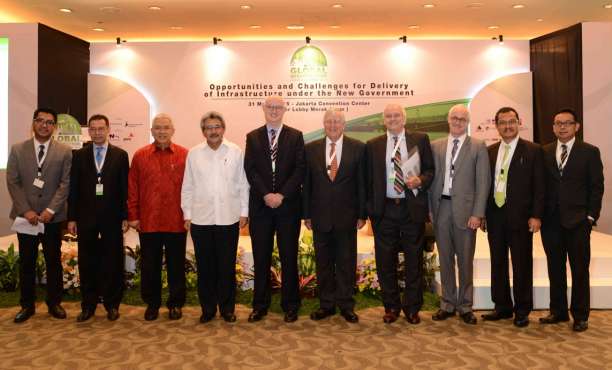Driving Progress of Infrastructure in Indonesia, Private Sector Holds Global Infrastructure Leaders Forum 2015 in Conjunction with the Government
GILF 2015 conference is expected to provide input and recommendations for the acceleration of infrastructure development in Indonesia, of which funding is constrained.
31 March 2015
Author: Administrator
The infrastructure sector is a priority of President Joko Widodo (Jokowi)’s administration to boost the Country’s economic growth rate in preparation for the implementation of the ASEAN Economic Community (AEC). Thus far, the PPP scheme, in cooperation with the government and the private sector, has yet to show progress and results that respond to the requirements.
In response to the current situation that requires urgent need of improvement, stakeholders in the private sector, together with the government, collaborates in a forum called the 2015 Global Infrastructure Leaders Forum (GILF). Following the success of the Infrastructure Leaders Forum (ILF) in 2012 and 2013, this year's event is expected to be an international forum with the participation of a wider audience.
GILF 2015 Conference Leader John Scott Younger said that the infrastructure sector in international forums is intended to be a driving force and initiator, aim at producing a solution for funding and accelerating the development of infrastructure in Indonesia. To accelerate the development of infrastructure, synergy between the private sector and the government is paramount, given the necessity for very large funds.
"The private sector wants to participate together with the government to be able to overcome the problems of an infrastructure gap that has now become a major concern in Indonesia, and in the eyes of the world. Approximately 25 speakers (infrastructure experts) – consisting of the central government, local government, infrastructure observers, foreign parties, academia and the private sector – will collaborate to find solutions together," said Scott, in Jakarta (31/3).
"We hope that GILF 2015 will be able to analyze issues, interests, opportunities and constraints, related regulations, as well as the determinants and the solution for Indonesia's infrastructure development," said Quad Management President Director Adhi Damono Seno, organizer of the GILF event.
PT Nusantara Infrastructure Tbk (NI) President Director Ramdani Basri appreciates the implementation of the GILF 2015 event to encourage the synergy between the private sector and the government towards the accelerated development of infrastructure.
"As a private company in the integrated infrastructure sector, Nusantara Infrastructure is committed to contributing to the advancement of infrastructure in the country. We will actively seek opportunities that exist. With the presence of GILF and other similar forums, we hope this will create a suitable platform for infrastructure companies in Indonesia, and overseas investors, to discuss the latest developments in this infrastructure sector," said Ramdani.
The results of the GILF 2015 conference are expected to contribute ideas for the development of infrastructure in Indonesia. President Joko Widodo’s mission in Nawa Cita, which would include expedited infrastructure projects, is constrained by many factors, such as budget, land acquisition and lack of local participation.
In the National Medium Term Development Plan (RPJMN) draft for 2015-2019, which is listed in the Ministry of National Development Planning, the required priority investment in the infrastructure sector reached Rp 5.452 trillion. The investment is expected to be the driving force of economic growth, targeted at approximately 6-8 percent.
The required priority investment is filtered from three funding scenarios for infrastructure in 2015-2019. The required fund for the first scenario, of the overall investment target (100%) implementation requires Rp 6.541 trillion. The second scenario, of 75% of the investment implementation, requires funds amounting to Rp 4.781 trillion. While the third scenario of only 50% of the investment implementation would require funds of Rp 3.561 trillion.
The Ministry of National Development Planning recognizes that from all three scenarios, the existing allocated infrastructure funding may not be sufficient if only sourced from the State Budget (APBN) and Regional Budget (APBD). The funding will thus need to be tailored further from State Owned Enterprises (SOEs), Public Private Partnerships (PPP), off-balance sheet, loans, bonds and others.
The Ministry of National Development Planning anticipates the 2015-2019 RPJMN infrastructure funding allocation from APBN and APBD will only reach approximately 22%. While the difference, or gap funding, from the plan will reach more than 70%. In terms of funding, the budget allocation of Indonesia's infrastructure still pales in comparison to China, reaching 10% GDP, Vietnam, amounting to 9% GDP, and India, at 7% GDP.
PricewaterhouseCoopers (PwC) Indonesia Advisor Julian Smith said that the growth of enterprise infrastructure and investment in Indonesia will spur an increase in the Indonesian economy. According to PwC, one of the sponsors of the event, this kind of forum can synergize the role of the government as well as the private sector.
"It is expected that private infrastructure companies in Indonesia will continue to grow in line with the more advanced infrastructure sector. Thus, this will allow them to contribute positively to economic growth in Indonesia," said Julian.
According to the Logistics Performance Index (LPI) survey in 2014, Indonesia ranked at number 53. Although up six points from position 59 the previous year, Indonesia’s rating is still far below neighboring countries, such as Singapore, at number 5, Malaysia, at number 25, and Thailand, at number 35. Indonesia is ranked close to Vietnam, at number 48.
One of the fundamental factors that need to be addressed to improve the LPI is infrastructure. The GILF 2015 event expects to counter obstacles that hinder the process of development and infrastructure projects, and that can be completed through a cooperative solution, hastened by real cooperation between all parties, especially between the government and the private sector.